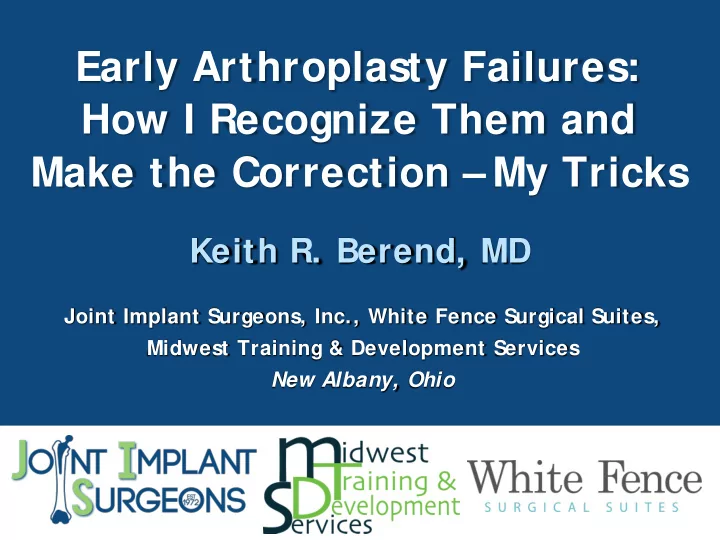

Early Arthroplasty Failures: How I Recognize Them and Make the Correction – My Tricks Keith R. Berend, MD Joint Implant Surgeons, Inc., White Fence Surgical Suites, Midwest Training & Development Services New Albany, Ohio
Keith R. Berend, MD Disclosure Consultant: ♦ Zimmer Biomet Royalties: ♦ Zimmer Biomet; Innomed Research Support: ♦ Zimmer Biomet; Pacira Pharmaceuticals; Orthosensor; SPR Therapeutics Development Partner: SurgCenter Development
Alignment of Expectations Pre-operative education Clear and accurate explanation of risks Need to know your own complication rates and profiles ♦ There is a 1% risk of something bad happening such as… ♦ You have a 1/20 chance of developing stiffness requiring another procedure
Intra-Operative ie. MCL Injury Always speak to the family after every surgery Answer any questions Give detailed and accurate explanations ♦ “We had some trouble with the ligaments so we used a special device that should work great and have no issues with recovery or outcome”
Immediate Post-op Nerve Palsy ♦ Take action! Malaligned implant ♦ Discuss with family and fix it Leg-Length Inequality ♦ Is it significant enough? ♦ Can you make it stable ♦ Acknowledge and fix?
Immediate Post-op Nerve Palsy ♦ Take action! Malaligned implant ♦ Discuss with family and fix it Leg-Length Inequality ♦ Is it significant enough? ♦ Can you make it stable ♦ Acknowledge and fix?
Early and Obvious Acknowledge the complication Address the complication Remedy the situation if you are qualified and comfortable ♦ If not, get help fast ♦ Direct surgeon to surgeon communication
Sometimes it is Obvious 88 y.o. male 13.5 x 112.5 Lateralized 10 wks postop OA 36mm CoCr on XLPE
Wound Grief
Early But Not As Obvious Continued pain/Excessive Pain ♦ Establish a narcotic agreement preoperatively (expectations) ♦ Consider steroids (oral/injection) Honeymoon phase of pain relief, pain returns ♦ Suspect aseptic loosening ♦ Serial radiographs Early “guided” second opinion
Subsidence and Aseptic Loose
Stiffness 6 Weeks exam ♦ Supine, goniometer-assisted ROM exam Is the patient happy with their motion? Is the ROM improved from pre-op? How’s the pain, swelling, effusion? ♦ If there is continued concern MUA is recommended and results discussed
MUA Document passive ROM under anesthesia Manipulate flexion using short lever-arm Manipulate extension using a heel bump +/- Inject with Steroid Repeat Manipulation Document with iPhone Goniometer App and Photographs
MUA Document passive ROM under anesthesia Manipulate flexion using short lever-arm Manipulate extension using a heel bump +/- Inject with Steroid Repeat Manipulation Document with iPhone Goniometer App and Photographs
You Are Responsible Stay In Charge Pre-Operative education to align expectations Be honest and address intra-operative and acute post-op complications Early referral to an expert or pointed second opinion Human nature says, ignore… do the oposite!
Recommend
More recommend